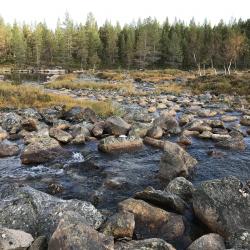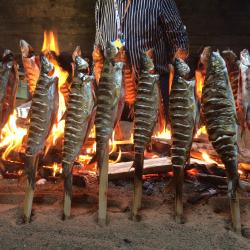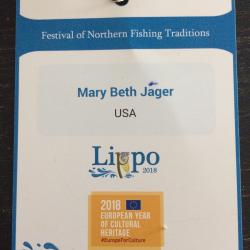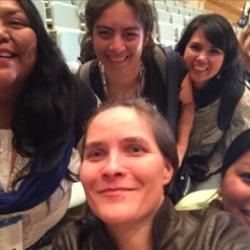“Field site visit to Indigenous-led ecological restoration and monitoring in the Näätämö catchment area.” I read the Festival of Northern Fishing Traditions pre-festival itinerary again as I waited for the plane to take off to Kirkenes, Norway. In about an hour I’d be joining Indigenous Foods Knowledges Network (IFKN) Steering Committee members Amy Juan (Tohono O’odham), Shawna Larson (Ahtna Athabascan and Supiaq) Althea Walker (Akimel O’otham), and IFKN PI/research coordination team member Noor Johnson (University of Colorado). As the plane sped up and hurtled into the sky, I closed my eyes. I needed the rest after the long day of travel to be coherent when I stepped off the plane and ready for the field visit the next day. An hour later, I woke up as the plane landed and felt rested enough. I stepped off the plane, breathed in the cold night air, and walked towards the terminal and unknowingly to a profoundly life changing experience.
The next morning, about twenty of us from various countries surrounded Pauliina Feodoroff (Skolt Sámi), one of the leads on the river restoration project. We all listened as she described the history of the area, her people, and why the project existed. Due to river modifications, less fish returned to spawn in the river. The Skolt Sámi people saw a need for this to change, secured funding, and are working to restore the river similar to its original size and form to hopefully bring the fish back. Pauliina led the group to various points along the river to show the work done and where the work had stopped until next summer.
Woven into the walk along the river, I participated and witnessed the beauty of Indigenous resilience. Songs, prayers, tears, and laughs happened. We shared similar pain of historical trauma and the challenges of continuing Indigenous Knowledges. We laughed and reminded each other we were not alone in this pain or work -- we had each other, our ancestors, our relationship with the land and resilience.
By the time all of us had arrived in Tornio, Finland for the Festival of Northern Fishing Traditions, I found new sisters and friends. Over 150 people participated in the festival. It included presentations about fishing and their own countries from people all over the globe. The Indigenous delegations from places like Canada, Aotearoa, Japan and Taiwan spoke of Indigenous resilience and the passing along of Indigenous Knowledges particularly as fishing as a way of life. The day following the meetings we all gathered around the Tornio river on both the Finnish and Swedish side to participate in fishing and feasting together.
“Wow, it looks like the trip had a profound impact and created a sisterly bond,” commented a friend over coffee. I blinked as I stared at her for a moment. I’d been back for over a month from Finland. “The look on all your faces,” she points to the picture. “This trip deeply affected all of you. I’ve lived long enough to know those opportunities don’t happen often, but when they do... when they do, well you know what it’s like,” and she points to the picture again. I look at the picture. Emotions and memories swell up in me. I nod in agreement because I struggle to find words to expand on the trip’s impact on me then and now being home.
However, I think what I experienced on this trip can strengthen the Indigenous Foods and Knowledges Network. We are not alone in doing this work. Remember our ancestors, the land, the creatures, our resilience, and future generations. We can support each other as we pass along Indigenous Knowledges and knowing this is happening in the Arctic, the US southwest and across the world.




